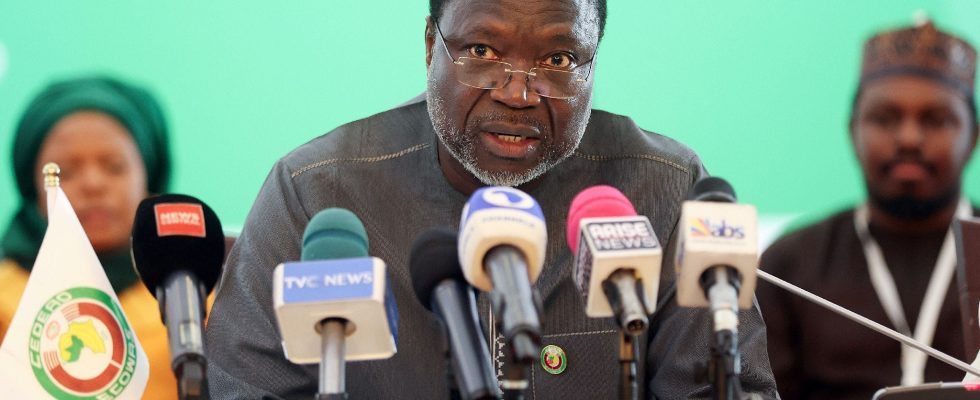It is a turning point in the region after several years of crisis. The Community of West African States (ECOWAS) decided this weekend to lift a large part of the sanctions against Niger, Guinea and Mali, expressing a desire to resume dialogue with these three military regimes in a context of regional crisis.
ECOWAS “has decided to lift with immediate effect” the heaviest sanctions imposed on Niger since the seizure of power in Niamey by a military regime which overthrew elected President Mohamed Bazoum in July, the organization announced Saturday afternoon . In a press release published on Sunday, ECOWAS also announced “lifting financial and economic sanctions against the Republic of Guinea” and “lifting restrictions on the recruitment of citizens of the Republic of Mali for professional positions within the ECOWAS institutions.
Burkina Faso, which is one of the four states led by military regimes since 2020, also subject to ECOWAS sanctions, is not mentioned in the final press release from the regional organization.
“Dialogue”
“We must review our approach to the return of constitutional order in four of our member countries,” declared in the introduction the Nigerian President Bola Ahmed Tinubu, who holds the presidency of ECOWAS, in reference to Mali, Burkina Faso, Niger and Guinea.
These decisions mark a step by ECOWAS towards the resumption of dialogue with these three military regimes, while Niger, Mali and Burkina Faso, which notably turned their backs on France and moved closer to Russia, announced in January their intention to leave ECOWAS.
The three countries have grouped together within an Alliance of Sahel States (AES). In mid-February, the head of the Nigerien military regime, General Abdourahamane Tiani, spoke of the possible creation of a common currency with Burkina Faso and Mali, as a “step out” of “colonization”.
In its press release, ECOWAS urges the three member states to resort to “dialogue, negotiation and mediation”. In Guinea, ECOWAS had banned financial transactions with its member institutions a year after the coming to power of Colonel Mamadi Doumbouya, who overthrew President Alpha Condé in September 2021. On Monday, the head of the junta announced by decree the dissolution of the government in office since July 2022.
In Mali, which experienced two coups d’état in 2020 and 2021, the regional bloc imposed economic and financial sanctions which it lifted in July 2022, when the ruling junta announced its transition timetable.
Niger’s borders and airspace will be reopened, financial transactions between ECOWAS countries and Niger will be authorized again, and Niger state assets will be thawed, “for humanitarian reasons”, he declared. . Military leaders in Niamey are also allowed to travel again. “Individual and political sanctions remain in place,” added Omar Alieu Touray without giving further details.
ECOWAS has once again demanded “the immediate release” of deposed Nigerien president Mohamed Bazoum, kept under house arrest with his wife by the military regime for seven months.
The last meeting of ECOWAS members was on February 9 when they called for “reconciliation” with the military regimes of Niger, Mali and Burkina Faso and urged them to remain in the regional bloc.
Crisis in Senegal
ECOWAS is also being tested by the political crisis that Senegal is experiencing since the postponement of the presidential election by Head of State Macky Sall.
The Senegalese president, who had not attended the previous summit, was present this time, two days after announcing that he would end his mandate when it expires on April 2 but without having set a new date for the presidential election.
The vote was initially scheduled to be held on February 25 but President Macky Sall postponed it at the beginning of February, plunging Senegal into one of the worst political crises in its post-independence history, causing great concern in the ranks of ECOWAS.
The regional bloc took “note of the end of the mandate of President Macky Sall on April 2, 2024 and congratulates him for the remarkable achievements in infrastructure and economic development” and called on “all Senegalese actors to favor dialogue in with a view to preserving Senegal’s democratic achievements through a free, inclusive and transparent presidential election.
